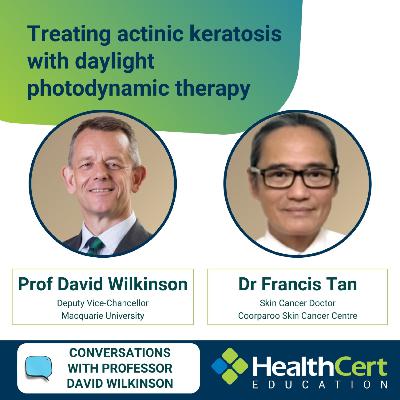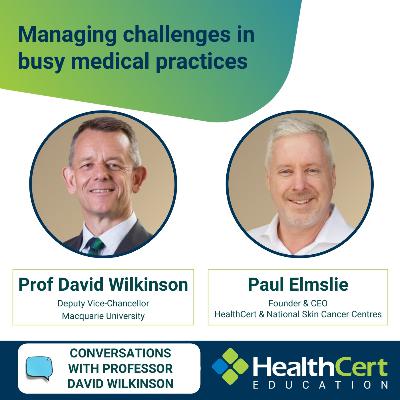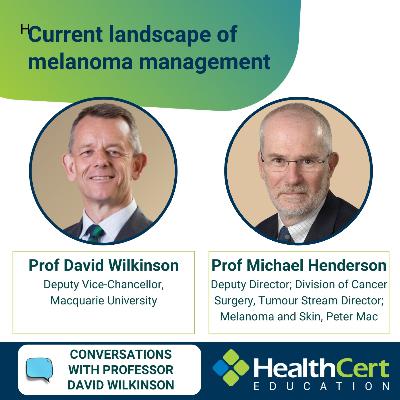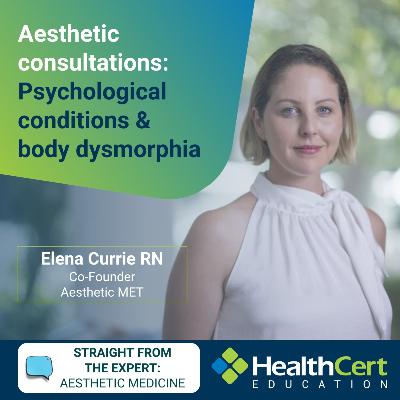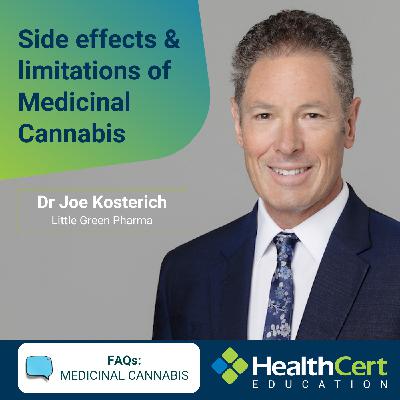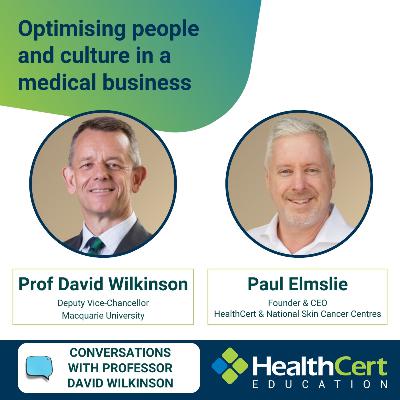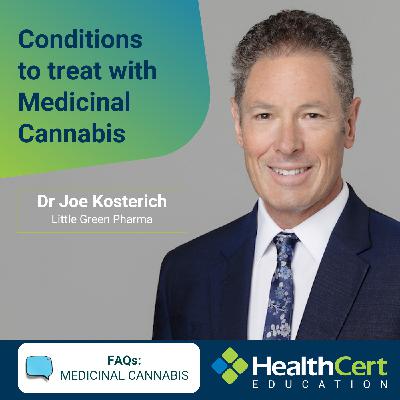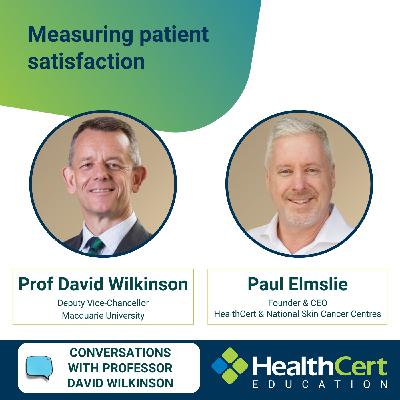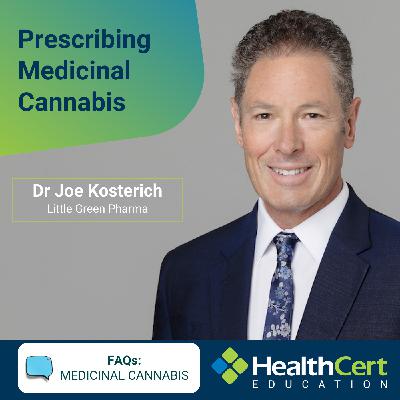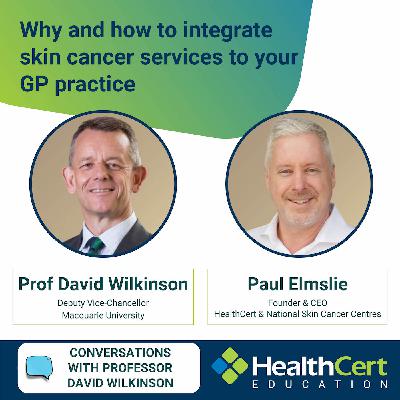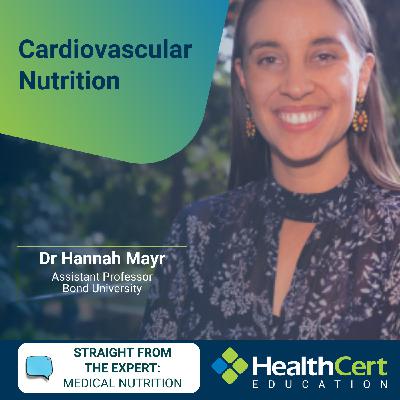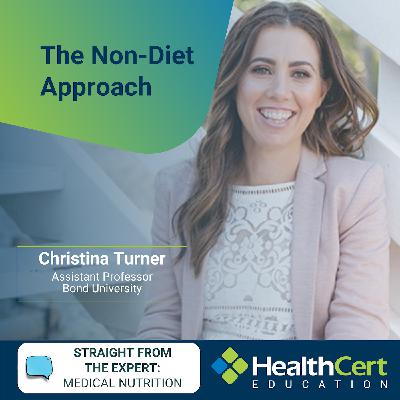Discover HealthCert Insights – A Podcast for Doctors, Nurses and Healthcare Professionals
HealthCert Insights – A Podcast for Doctors, Nurses and Healthcare Professionals

HealthCert Insights – A Podcast for Doctors, Nurses and Healthcare Professionals
Author: HealthCert Education
Subscribed: 7Played: 316Subscribe
Share
© Copyright 2022. All rights reserved.
Description
HealthCert Insights, presented by HealthCert Education, shares practical advice from leading clinicians and educators to help doctors, nurses, and healthcare professionals treat with confidence and expand their scope of practice.
115 Episodes
Reverse
In this episode, Professor David Wilkinson (Deputy Vice-Chancellor at Macquarie University) speaks with Dr Stephen Wassall – who works as a Skin Cancer & Aesthetic Medicine Doctor in a dedicated primary care clinic in New South Wales – about his journey integrating aesthetic services into a skin cancer or primary care practice.
In the podcast, Dr Wassall speaks about how he started out pursuing his interest in skin cancer and aesthetic medicine, evolving from a general practitioner to a subspecialist in these fields. He discusses how his practice operates in terms of skin cancer procedures, onward referrals, and the scope of skin cancer patients he and his team manage at the clinic.
----more----
In Dr Wassall’s clinic, cosmetic treatments are offered alongside skin cancer services, ranging from skin needling to anti-wrinkle injections and more. Dr Wassall explains how this works, how he keeps the two areas separate (without “cross-selling” to his skin cancer patients), and how he has established his reputation and grown his work from the ground up. He also talks about building rapport with patients and accruing repeat patients through word-of-mouth referrals.
Importantly, the podcast also explores the negative backlash that some doctors face when first starting out in aesthetic medicine. Dr Wassall describes his own experiences with this and provides helpful advice for doctors starting out in aesthetic medicine, or those considering implementing some aesthetic services into their practice.
About Presenters
Professor David Wilkinson is Deputy Vice-Chancellor at Macquarie University. He is a registered general practitioner and public health medicine specialist. Since 2004, Professor Wilkinson’s clinical work has focused on skin cancer medicine in primary care. He has published research papers on the topic, designed and led development of the only Master of Medicine degree in skin cancer, and helped develop and present a suite of skin cancer short courses delivered by HealthCert Education.
Dr Stephen Wassall is a renowned skin cancer and aesthetic medicine doctor, having practised skin cancer medicine since 1997 and non-invasive facial rejuvenation procedures since 2002. He was the first doctor on the Central Coast to use a Molemax machine for photographing suspicious moles for future comparison, and is the most experienced cosmetic injector on the Central Coast, having performed over 20,000 injectable procedures.
A graduate of The University of Sydney, Dr Wassall was an intern, resident and registrar at Gosford Hospital until 1993. He completed Specialist GP training in 1996 and completed a Masters in Skin Cancer Medicine with The University of Queensland in 2007. He is extensively involved in teaching other GPs, presenting lectures on skin cancer surgery and demonstrating advanced skin cancer surgery and aesthetic procedures to doctors.
Dr Wassall worked in his own solo practice in Wamberal between 1996 and 1999. He joined Terrigal Medical Centre in 1999 as a Practice Principal and subsequently worked at the Mediskin Clinic between 2003 and 2011. In 2011 Mediskin Clinic became Skin Integrity and Dr Wassall began working exclusively in the fields of skin cancer and cosmetic medicine.
When utilising a medical service, patients are very discerning about time management and are focused on getting the best care in the shortest timeframe and at the more affordable price. Realistically, patient complaints are a common occurrence in the majority of medical practices.
In this podcast, Paul talks about the most common reason for patient complaints (including the doctor running late and poor communication) and how doctors and practice managers can best manage these complaints.
----more----
There are two types of complaints: those that are voiced inside the clinic and those that are expressed outside the clinic (through social media, word of mouth or online reviews, by way of example). Paul explains some strategies for handling both types of patient complaints in a way that minimises damage to the reputation of you and your medical practice.
Unfortunately, patients who have a negative experience are more likely to tell people about that experience than patient who have a positive one. Paul covers some of the ways doctors and practice managers can communicate with patients to resolve issues before they develop.
About Presenters
Professor David Wilkinson is Deputy Vice-Chancellor at Macquarie University. He is a registered general practitioner and public health medicine specialist. Since 2004, Professor Wilkinson’s clinical work has focused on skin cancer medicine in primary care. He has published research papers on the topic, designed and led development of the only Master of Medicine degree in skin cancer, and helped develop and present a suite of skin cancer short courses delivered by HealthCert Education.
Paul Elmslie is the Founder and CEO of HealthCert Education and the National Skin Cancer Centres. Paul is a pioneer of the subspecialised skin cancer clinic model and has built a network of dedicated skin cancer referral centres and training facilities across Australia. Paul has owned or operated about 28 skin cancer clinics in his 20+ years of experience.
In this latest podcast, Dr Orit Holtzman – Vice-President of the Australian & New Zealand College of Cannabinoid Practitioners (ANZCCP) – explores the grounds for prescribing medicinal cannabis in Australia, including the common challenges faced by primary care doctors and how to overcome them.
In the podcast, Dr Holtzman talks about her own journey applying medicinal cannabis into her day to day medical practice, including the “not so easy” step of becoming a cannabis prescriber in Australia. She describes how she put it in the “too hard basket” – a common sentiment among many practitioners in Australia – until some of her patients began asking whether they could be treated with medicinal cannabis to help with their conditions. Rather than turn them away, Dr Holtzman sought to help these patients achieve the best possible outcomes.
Dr Holtzman talks about her journey getting approval for her first medicinal cannabis application, undergoing further training in the field, and then actively prescribing medicinal cannabis as part of her day to day work.
Dr Orit Holtzman is a medical doctor with a special interest in functional medicine and medicinal cannabis. She holds a Bachelor of Science in biology and psychology from the University of Tel Aviv, a PhD in neuroscience from the University of NSW, and an MBBS from the Sydney Medical School at the University of Sydney. After working in the public hospital system, Dr Holtzman has begun exploring wholistic health solutions and become passionate about utilising medicinal cannabis as a therapeutic agent. She began prescribing cannabis in 2019 under the mentorship of Dr Teresa Towpik, when she joined Compass Lifestyle Clinics. She now has more than 200 patients that have been approved for medicinal cannabis for various indications under her care, and is an authorised prescriber for multiple conditions. She also works as a medical educator, teaching doctors about medicinal cannabis and the endocannabinoid system.
Do you struggle with poor staff performance in your medical practice? This latest podcast looks at intervention strategies for managing poor performance and improving staff behaviours, with Prof David Wilkinson and Mark Lindley.
In the podcast, Mark outlines what is meant by poor performance, including behavioural problems. He discusses some of the shortfalls in communication that can lead to tasks being poorly executed, and how managers can sit down with their staff to identify what needs to be achieved, how it should be achieved, how the outcome will be measured, and when the outcome will be measured.
Underpinning effective communication are clarity and specificity. At every stage throughout the hiring, onboarding and probation period, employees should be very clear about what their role is. In scenarios where there is a communication breakdown, it is essential for both parties to find ways to bridge that gap.
The podcast also explores how to set up employees for the best possible start, including how to modify an induction program so that employees are able to work independently and identify gaps in their own knowledge and skills.
Mark goes on to describe how best to intervene and manage employees who are performing poorly.
Professor David Wilkinson is Deputy Vice-Chancellor at Macquarie University. He is a registered general practitioner and public health medicine specialist. Since 2004, Professor Wilkinson’s clinical work has focused on skin cancer medicine in primary care. He has published research papers on the topic, designed and led development of the only Master of Medicine degree in skin cancer, and helped develop and present a suite of skin cancer short courses delivered by HealthCert Education.
In this episode, Prof David Wilkinson (Deputy Vice-Chancellor at Macquarie University) speaks with Dr Francis Tan – a dedicated Skin Cancer Doctor who has practised in the field since 1994 – about daylight photodynamic therapy as a front-line treatment for actinic keratosis.
In the podcast, Dr Tan speaks about his own experiences as a dedicated skin cancer practitioner over the past three decades, including the reasons he embarked in the field: namely, he liked working with his hands, and the immediacy of diagnosing and curing his patients of their ailments.
----more----
The podcast further explores daylight photodynamic therapy (PDT) and its benefits for treating actinic keratoses. Daylight PDT is fast becoming the best field treatment for these types of lesions, and Dr Tan speaks about how he uses this therapy in his practice in Queensland, particularly on the face and balding scalp.
Dr Tan walks through the step-by-step process of treating patients with daylight PDT. He discusses which patients are candidates for this treatment which includes men who work outdoors and patients with a lot of sun damage.
----more----
About Presenters
Professor David Wilkinson is Deputy Vice-Chancellor at Macquarie University. He is a registered general practitioner and public health medicine specialist. Since 2004, Professor Wilkinson’s clinical work has focused on skin cancer medicine in primary care. He has published research papers on the topic, designed and led development of the only Master of Medicine degree in skin cancer, and helped develop and present a suite of skin cancer short courses delivered by HealthCert Education.
Dr Francis Tan is a Skin Cancer Doctor at Coorparoo Skin Cancer & Skin Repair Centre in Brisbane. He graduated from The University of New South Wales in 1986. He worked in a variety of general practice surgeries throughout Australia, including clinics in Sydney, Tweed Heads, the Gold Coast, Brisbane and Cairns. Dr Tan obtained a Masters of Medicine from The University of Queensland in 2014 and holds an impressive portfolio of university-certified Professional Diplomas in Skin Cancer Medicine and related fields. He is particularly interested in using dermatoscopy to detect melanoma in situ and performing skin cancer surgery to the best of his ability for the benefit of his patients.
In this latest podcast, Elena Currie (Co-founder, Aesthetic MET) talks about delayed inflammatory reactions, including what causes them, what symptoms patients can experience, and how long after treatment the symptoms may appear.
----more----
Inflammatory reactions are immune responses to certain aesthetic treatments. Symptoms most commonly include moderate to severe swelling in the treatment area and surrounding tissue, and inflammatory nodule formations.
Some energy-based treatments such as lasers and radio-frequency devices can trigger significant swelling post-treatment.
Injectable therapies like fillers and collagen stimulators can cause inflammatory nodule formations quite quickly after treatment, most often caused by the patient’s foreign body reaction to the filler material.
In the podcast, Elena further covers:
The aesthetic treatments which can lead to a delayed inflammatory reaction.
What causes delayed inflammatory reactions.
The symptoms patients experience.
What you can do to decrease risk of these reactions among your patients.
How delayed these reactions can be.
The treatment options for delayed inflammatory reactions, including the results you can expect and how quickly the treatments work.
How you can manage patients’ reactions (mood/attitude) after they have experienced an adverse reaction and what you can do to calm and reassure them.
How this relates to the COVID vaccine.
In the podcast, Paul discusses the key challenges faced by doctors outside of their clinical work when they own and manage a medical practice.
One of these challenges includes human resources, especially the recruitment of good doctors within the practice, managing staff conflicts, and building an effective support team of nurses, reception and clinical staff who will help with the day-to-day running of the clinic.
Paul discusses how doctors can approach the hiring, leading and managing of other doctors within their practice, as well as Practice Managers, receptionists, nurses, and other clinical staff.
Another common challenge is time management. Paul explores some of automation tools that can help save time and enable the practice to run more efficiently, thereby optimising patient outcomes and maximising income.
----more----
About Presenters
Professor David Wilkinson is Deputy Vice-Chancellor at Macquarie University. He is a registered general practitioner and public health medicine specialist. Since 2004, Professor Wilkinson’s clinical work has focused on skin cancer medicine in primary care. He has published research papers on the topic, designed and led development of the only Master of Medicine degree in skin cancer, and helped develop and present a suite of skin cancer short courses delivered by HealthCert Education.
Paul Elmslie is the Founder and CEO of HealthCert Education and the National Skin Cancer Centres. Paul is a pioneer of the subspecialised skin cancer clinic model and has built a network of dedicated skin cancer referral centres and training facilities across Australia. Paul has owned or operated about 28 skin cancer clinics in his 20+ years of experience.
With the launch of our new online Professional Diploma of Medicinal Cannabis program – the first university-reviewed program in medicinal cannabis for doctors in Australia – Dr Joe Kosterich recently held an insightful webinar on the uses and benefits of medicinal cannabis in primary care.
To address the significant number of questions that arose from this webinar, we have compiled a four-part FAQ series with Dr Kosterich. In the final podcast in the four-part series, Dr Kosterich answers your most common questions about the evidence surrounding the use of medicinal cannabis in primary care (and so much more!).
----more----
Dr Joe Kosterich is a doctor, speaker, author, media presenter and health industry consultant. Wanting you to be healthy and get the most out of life, Dr Kosterich writes for numerous medical and mainstream publications and is a regular on radio and television. He is often called to give opinions in medico legal cases, is clinical editor of Medical Forum Magazine, adjunct professor (teaching) at UWA and a lecturer at Curtin Medical School. Medical Advisor to Medicinal Cannabis company Little Green Pharma and Chairman of Australian Tobacco Harm Reduction Association, Dr Kosterich has self-published two books: Dr Joe’s DIY Health and 60 Minutes To Better Health, and maintains a website and blog with health information and commentary. Previously he held senior positions in the Australian Medical Association and sat on numerous industry and government boards. He has extensive corporate experience in the setting up and management of medical centres and in helping businesses maintain a healthy workforce. Through all this he continues to see patients as a GP each week.
In the podcast, Mark speaks about the melting pot of personalities, influences and behaviours in the workplace. He covers some of the ways practice owners and managers can prevent staff issues before they arise. This can be particularly through optimising communication channels and remembering that all employees come to work each day for the betterment of their patients.
----more----
Mark discusses the most common problems practice managers will encounter in human resources, including:
Communication style
Workflow
Clashing emotions
The podcast delves deeper into these common problems and offers some solutions practice managers can take on board.
Mark also touches on the issue of hierarchy, ownership and authority within a medical practice and how practice managers can handle this. It is essential that all staff respect the structure and understand who does what job, without assuming that one job is more important than another.
Professor David Wilkinson is Deputy Vice-Chancellor at Macquarie University. He is a registered general practitioner and public health medicine specialist. Since 2004, Professor Wilkinson’s clinical work has focused on skin cancer medicine in primary care. He has published research papers on the topic, designed and led development of the only Master of Medicine degree in skin cancer, and helped develop and present a suite of skin cancer short courses delivered by HealthCert Education.
Welcome to this podcast series, Conversations with Professor David Wilkinson! In this episode, Professor David Wilkinson (Deputy Vice-Chancellor, Macquarie University) speaks with Professor Michael Henderson (Deputy Director; Division of Cancer Surgery, Tumour Stream Director; Melanoma and Skin, Peter Mac) about the current landscape of melanoma management.
----more----
Prof Henderson talks about how the treatment of melanoma has significantly changed not just over his career, but even in the past few years. He speaks about the options now available to patients with advanced metastatic melanoma – treatments that offer more hope than ever before and can dramatically improve patient prognosis.
The latest data suggests that 70 per cent or more of patients who receive combination immunotherapy for melanoma are likely to survive five years – an extraordinary feat in comparison to statistics from just 10 years ago.
In the podcast, Prof Henderson speaks about the stage at which primary care doctors should be sending patients on to a melanoma unit, and when referral to these tertiary centres is most appropriate. This includes mention of the latest melanoma management guidelines.
Prof Henderson also discusses sentinel node biopsy and whether this is a recommended or necessary standard of care in melanoma management.
Hear all this and much more in the full podcast above.
Professor David Wilkinson is Deputy Vice-Chancellor at Macquarie University. He is a registered general practitioner and public health medicine specialist. Since 2004, Professor Wilkinson’s clinical work has focused on skin cancer medicine in primary care. He has published research papers on the topic, designed and led development of the only Master of Medicine degree in skin cancer, and helped develop and present a suite of skin cancer short courses delivered by HealthCert Education.
Professor Michael Henderson is a Professor of Surgery with the The University of Melbourne and surgeon in the Melanoma and Skin Service, Breast Service and Sarcoma Service at Peter Mac. He graduated in medicine from The University of Melbourne and trained as a general surgeon. He completed his training with a Fellowship in Surgical Oncology at the University of Texas MD Anderson Cancer Centre in Houston. Melanoma makes up a major part of his clinical workload and he is actively involved in clinical and translational research. He maintains an active clinical and translational research interest in melanoma and is supervising several higher degree research candidates.
In this latest podcast, Elena Currie (Co-founder, Aesthetic MET) talks about aesthetic consultations and how to manage the problem of psychological conditions and body dysmorphia among your patients.
----more----
A psychological focus is crucial to identify the drivers for patients wanting cosmetic procedures and to assess whether they are doing it for the right reasons. In the podcast, Elena talks about what body dysmorphia is and why it’s important for medical practitioners to keep it in mind as part of every aesthetic consultation.
Body dysmorphia is an imagined defect or a completely distorted perception a person possesses about their physical appearance. This is a diagnosed psychiatric disorder with compulsive behaviours, rather than simply a poor body image. Patients with body dysmorphia may change clothes often throughout the day or wear loose clothing to camouflage their perceived flaw; they may wear excessive make-up or check their reflection in a mirror repeatedly throughout the day.
Elena believes that medical practitioners in the aesthetic industry have a duty of care to guide patients with body dysmorphia in the right direction. Studies have shown that only about 3.6 per cent of people with this condition actually have an improvement in their symptoms following a cosmetic procedure.
It’s important for practitioners to screen patients for symptoms or compulsions of body dysmorphia during an aesthetic consultation, because treating these patients can lead to dissatisfaction from the patient as well as aggression and abuse towards the practitioner.
Elena gives practical advice for the questions practitioners can ask during aesthetic consultations and what to keep in mind, including understanding patients’ mental and emotional health. She also discusses the mistakes to avoid when conducting an aesthetic consultation, including poor communication and pointing out patients’ flaws rather than strengths.
The podcast also covers how practitioners can create an environment of trust and set appropriate expectations for their patients.
With the launch of our new online Professional Diploma of Medicinal Cannabis program – the first university-reviewed program in medicinal cannabis for doctors in Australia – Dr Joe Kosterich recently held an insightful webinar on the uses and benefits of medicinal cannabis in primary care.
To address the significant number of questions that arose from this webinar, we have compiled a four-part FAQ series with Dr Kosterich. In the third podcast in the series, Dr Kosterich answers your most common questions about the implications, side effects and limitations of medicinal cannabis (and so much more!).
----more----
Dr Joe Kosterich is a doctor, speaker, author, media presenter and health industry consultant. Wanting you to be healthy and get the most out of life, Dr Kosterich writes for numerous medical and mainstream publications and is a regular on radio and television. He is often called to give opinions in medico legal cases, is clinical editor of Medical Forum Magazine, adjunct professor (teaching) at UWA and a lecturer at Curtin Medical School. Medical Advisor to Medicinal Cannabis company Little Green Pharma and Chairman of Australian Tobacco Harm Reduction Association, Dr Kosterich has self-published two books: Dr Joe’s DIY Health and 60 Minutes To Better Health, and maintains a website and blog with health information and commentary. Previously he held senior positions in the Australian Medical Association and sat on numerous industry and government boards. He has extensive corporate experience in the setting up and management of medical centres and in helping businesses maintain a healthy workforce. Through all this he continues to see patients as a GP each week.
Welcome to this podcast series, Conversations with Professor David Wilkinson! In this episode, Professor David Wilkinson (Deputy Vice-Chancellor at Macquarie University) speaks with Paul Elmslie (Founder and CEO of HealthCert Education and the National Skin Cancer Centres) about a key part of a successful medical business: people.
----more----
About Presenters
Professor David Wilkinson is Deputy Vice-Chancellor at Macquarie University. He is a registered general practitioner and public health medicine specialist. Since 2004, Professor Wilkinson’s clinical work has focused on skin cancer medicine in primary care. He has published research papers on the topic, designed and led development of the only Master of Medicine degree in skin cancer, and helped develop and present a suite of skin cancer short courses delivered by HealthCert Education.
Paul Elmslie is the Founder and CEO of HealthCert Education and the National Skin Cancer Centres. Paul is a pioneer of the subspecialised skin cancer clinic model and has built a network of dedicated skin cancer referral centres and training facilities across Australia. Paul has owned or operated about 28 skin cancer clinics in his 20+ years of experience.
In this insightful podcast, Elena Currie (Co-founder, Aesthetic MET) talks about cosmetic injectables, adverse reactions, and how medical practitioners can get support with managing complications.
In the podcast, Elena describes the current market for cosmetic procedures in Australia – particularly injectable procedures like dermal fillers and anti-wrinkle injections – and how this impacts practitioners and patients.
----more----
Elena discusses the possible adverse reactions and side effects of cosmetic injectables, including blindness and interaction with adjacent muscles, and the actual risk of these adverse events occurring. She also talks about complications like vascular occlusions and delayed inflammatory reactions, which affect around one per cent of patients.
There is often a false stigma attached to adverse events from cosmetic injectables that purports any complications are related to the experience level of the practitioner who performs the procedure. In fact, research has found that 65 per cent of practitioners with 11+ years experience has had one or more adverse events.
Elena breaks down the Four Ps of the real causes of adverse reactions: the practitioner, the patient, the placement, and the product. She says two of the main mistakes made by practitioners are failing to have a sound understanding of facial anatomy and injecting too fast.
In terms of the patient, cosmetic injectables stimulate an immune response that not all patients can tolerate, and not all patients will fit into a “textbook” case. It’s important to ensure that patients are receiving these treatments for the right reasons and don’t try to overdo it.
Elena then discusses some of the options available to practitioners in terms of finding the right training to perform cosmetic injectables as well as adequate support in managing complications. She explains the importance of finding a credible training provider that avoids pharmaceutical sponsorship where possible, delivered by experts who are practising and invested in the field.
In terms of managing complications, Elena co-founded Aesthetic MET to create a formalised, structured aesthetic safety support service. You can learn more about Aesthetic MET and much more in the full podcast below.
With the launch of our new online Professional Diploma of Medicinal Cannabis program – the first university-reviewed program in medicinal cannabis for doctors in Australia – Dr Joe Kosterich recently held an insightful webinar on the uses and benefits of medicinal cannabis in primary care.
To address the significant number of questions that arose from this webinar, we have compiled a four-part FAQ series with Dr Kosterich. In the second podcast in the series, Dr Kosterich answers your most common questions about conditions medicinal cannabis can treat in primary care (and so much more!).
----more----
Dr Joe Kosterich is a doctor, speaker, author, media presenter and health industry consultant. Wanting you to be healthy and get the most out of life, Dr Kosterich writes for numerous medical and mainstream publications and is a regular on radio and television. He is often called to give opinions in medico legal cases, is clinical editor of Medical Forum Magazine, adjunct professor (teaching) at UWA and a lecturer at Curtin Medical School. Medical Advisor to Medicinal Cannabis company Little Green Pharma and Chairman of Australian Tobacco Harm Reduction Association, Dr Kosterich has self-published two books: Dr Joe’s DIY Health and 60 Minutes To Better Health, and maintains a website and blog with health information and commentary. Previously he held senior positions in the Australian Medical Association and sat on numerous industry and government boards. He has extensive corporate experience in the setting up and management of medical centres and in helping businesses maintain a healthy workforce. Through all this he continues to see patients as a GP each week.
Welcome to our podcast series on medical business management, Conversations with Professor David Wilkinson! In this episode, Professor David Wilkinson (Deputy Vice-Chancellor at Macquarie University) speaks with Paul Elmslie (Founder and CEO of HealthCert Education and the National Skin Cancer Centres) about how to deliver a really high quality skin cancer service for your patients and measure patient satisfaction.
Prof Wilkinson and Paul speak about how this goes beyond the standard clinical care provided by general practitioners and primary care doctors.
----more----
In everything we do, we expect good quality products and services – whether it be getting our car serviced, having a hair cut or visiting the doctor. We look for services that deliver what we need while also being professional, on time, clean and COVID-Safe. This podcast looks at the importance of the service patients receive and how doctors can provide a really good service outside of the clinical work, and how this is measured and managed.
It is important to note that patients have choices – they don’t have to see you. And a patient with a poor experience has the ability to tell tens of thousands of other potential patients about their situation via online platforms. Paul talks about how doctors can manage the patient journey – all the way from booking their appointment to the recall and follow-up stages – to minimise patient complaints, create raving fans, and ultimately deliver an exceptional patient experience.
Everyone plays a role in patient satisfaction – from the receptionist to the doctor and beyond. A great way of measuring this patient satisfaction is through a Net Promoter Score (NPS) that collects feedback from patients immediately after their appointment. This kind of data is essential for understanding what is working well in your practice and what areas need to be improved. Paul discusses how the NPS works and how the data can be used to improve the overall patient experience in your practice.
Did you know: People are 10 times more likely to share a negative experience with their friends than a positive experience.
Importantly, Paul says that the key thing you need to do as a doctor or practice manager when managing poor patient feedback is to show that you are listening, that you care, and that you are going to take action. This helps to diffuse the situation and can convert a patient from a “detractor” into a “promoter”.
About Presenters
Professor David Wilkinson is Deputy Vice-Chancellor at Macquarie University. He is a registered general practitioner and public health medicine specialist. Since 2004, Professor Wilkinson’s clinical work has focused on skin cancer medicine in primary care. He has published research papers on the topic, designed and led development of the only Master of Medicine degree in skin cancer, and helped develop and present a suite of skin cancer short courses delivered by HealthCert Education.
Paul Elmslie is the Founder and CEO of HealthCert Education and the National Skin Cancer Centres. Paul is a pioneer of the subspecialised skin cancer clinic model and has built a network of dedicated skin cancer referral centres and training facilities across Australia. Paul has owned or operated about 28 skin cancer clinics in his 20+ years of experience.
With the launch of our new online Professional Diploma of Medicinal Cannabis program – the first university-reviewed program in medicinal cannabis for doctors in Australia – Dr Joe Kosterich recently held an insightful podcast on the uses and benefits of medicinal cannabis in primary care.
To address the significant number of questions that arose from this webinar, we have compiled a four-part FAQ series with Dr Kosterich. In the first podcast in the series, Dr Kosterich answers your most common questions about prescribing medicinal cannabis in primary care (and so much more!).
----more----
Dr Joe Kosterich is a doctor, speaker, author, media presenter and health industry consultant. Wanting you to be healthy and get the most out of life, Dr Kosterich writes for numerous medical and mainstream publications and is a regular on radio and television. He is often called to give opinions in medico legal cases, is clinical editor of Medical Forum Magazine, adjunct professor (teaching) at UWA and a lecturer at Curtin Medical School. Medical Advisor to Medicinal Cannabis company Little Green Pharma and Chairman of Australian Tobacco Harm Reduction Association, Dr Kosterich has self-published two books: Dr Joe’s DIY Health and 60 Minutes To Better Health, and maintains a website and blog with health information and commentary. Previously he held senior positions in the Australian Medical Association and sat on numerous industry and government boards. He has extensive corporate experience in the setting up and management of medical centres and in helping businesses maintain a healthy workforce. Through all this he continues to see patients as a GP each week.
In the podcast, Paul covers how medical practitioners might go about setting up skin cancer services in an existing general practice setting or subspecialised clinic.
Paul talks about what an ideal skin cancer service might look like, focusing on how to achieve early diagnosis and management of skin cancer and having conversations with patients in primary care about their skin cancer risk. He also discusses the differences between standalone skin cancer facilities versus skin cancer services delivered within a general practice, and how this has changed over the years.
----more----
When providing skin cancer care within general practice, Paul recommends setting aside a dedicated block of time each week in which you only perform skin checks, biopsies and treatments, in order to streamline the services.
David and Paul also discuss the importance of GPs having the competence and confidence to pick up a dermatoscope and check any suspicious lesions incidentally noticed during patient consultations in mainstream general practice.
About Presenters
Professor David Wilkinson is Deputy Vice-Chancellor at Macquarie University. He is a registered general practitioner and public health medicine specialist. Since 2004, Professor Wilkinson’s clinical work has focused on skin cancer medicine in primary care. He has published research papers on the topic, designed and led development of the only Master of Medicine degree in skin cancer, and helped develop and present a suite of skin cancer short courses delivered by HealthCert Education.
Paul Elmslie is the Founder and CEO of HealthCert Education and the National Skin Cancer Centres. Paul is a pioneer of the subspecialised skin cancer clinic model and has built a network of dedicated skin cancer referral centres and training facilities across Australia. Paul has owned or operated about 28 skin cancer clinics in his 20+ years of experience.
Dr Hannah Mayr – Assistant Professor at Bond University and one of the expert presenters of the HealthCert Advanced Certificate of Medical Nutrition Management – delivers an insightful podcast on nutrition and dietary patterns and their role in cardiovascular disease (CVD) prevention and management.
In the podcast, Dr Mayr explains how a dietary pattern approach to CVD management differs from a traditional approach.
----more----
Dietary approaches towards CVD management have typically taken a nutrient-based focus, like lowering saturated fats or reducing sodium in the diet, or a focus on specific food groups, like vegetables. Often these approaches are targeted towards clinical risk factors, but fail to reflect how patients truly eat foods.
A dietary pattern approach considers the combinations of foods that should make up a person’s diet. It focuses on which types of foods are eaten regularly and which foods should be eaten less often, and can translate better into practical recommendations and is less prescriptive than traditional diets.
About presenter - Dr Hannah Mayr
Dr Hannah Mayr is an Accredited Practicing Dietitian who completed her PhD thesis at La Trobe University. Under the principal supervision of leading Mediterranean diet researcher, Prof Catherine Itsiopoulos, she investigated the effect of a Mediterranean versus low-fat diet on inflammation and adiposity in patients with coronary heart disease.
Dr Mayr has published a number of reviews, methods and results-based papers within this work and received the ‘New Researcher Award’ at the 2018 Dietitians Association of Australia National Conference for her thesis work exploring a novel dietary assessment tool, the Dietary Inflammatory Index. Her research and practice interests are in dietary patterns and interventions, chronic disease and metabolic health.
Dr Mayr currently works as a post-doctoral researcher at Princess Alexandra Hospital (PAH) in Brisbane and externally with La Trobe, which includes activities to enable implementation of the Mediterranean diet into routine care for chronic disease management. At PAH she leads a mentorship group focused on research capacity building for clinical dietitians. She also teaches into the Master of Nutrition and Dietetics at Bond University and she is passionate about engaging dietetics students in research activities.
Show notes
Heart Foundation: Heart Healthy Eating Patterns:
https://www.heartfoundation.org.au/getmedia/e86eadc0-db35-4e71-815d-75614414f79a/Nutrition_Position_Statement_-_HHEP_FINAL-3.pdf
Heart Foundation: Dietary Patterns and Cardiovascular Disease Outcomes:
https://www.heartfoundation.org.au/getmedia/463b101d-0741-47fb-8f89-09629d8cc6d4/Dietary_patterns_and_cardiovascular_disease_outcomes.pdf
Dietary Guidelines for Americans 2015-2020 8th Ed.:
https://health.gov/our-work/food-nutrition/2015-2020-dietary-guidelines/guidelines/
If you have any questions for Dr Hannah Mayr, we invite you to join the free HealthCert Community at community.healthcert.com and comment your questions on this post.
In the podcast, Christina explains what the non-diet approach to weight management actually means and how it works. The non-diet approach is a set of strategies that medical professionals can use to support patients in their healthcare, with an overall aim of helping patients to improve their health without necessarily changing their body weight. The non-diet approach has a strong focus on supporting patients to eat a wide variety of foods to achieve nutritional quality, rather than prescribing meal plans or portion sizes for weight loss.
----more----
About presenter - Christina Turner
Christina also talks about some non-diet strategies including mindful eating, such as eating with our five senses, as well the Health At Every Size movement, and so much more. Christina is currently a Senior Teaching Fellow and Internships Lead within the Master of Nutrition and Dietetic Practice Program at Bond University. She teaches into the clinical and communication/counselling subjects including eating disorders, weight-inclusive practice and non-diet nutrition, cognitive-behavioural therapy and motivational interviewing topics.
Show notes
Association for Size Diversity and Health (ASDAH): https://www.sizediversityandhealth.org/
Health at every size Australia: https://www.haesaustralia.org.au/
Find a weight neutral health care provider: https://www.haesaustralia.org.au/find-a-provider
If you have any questions for Dr Christina Turner, we invite you to join the free HealthCert Community at community.healthcert.com and comment your questions on this post.






